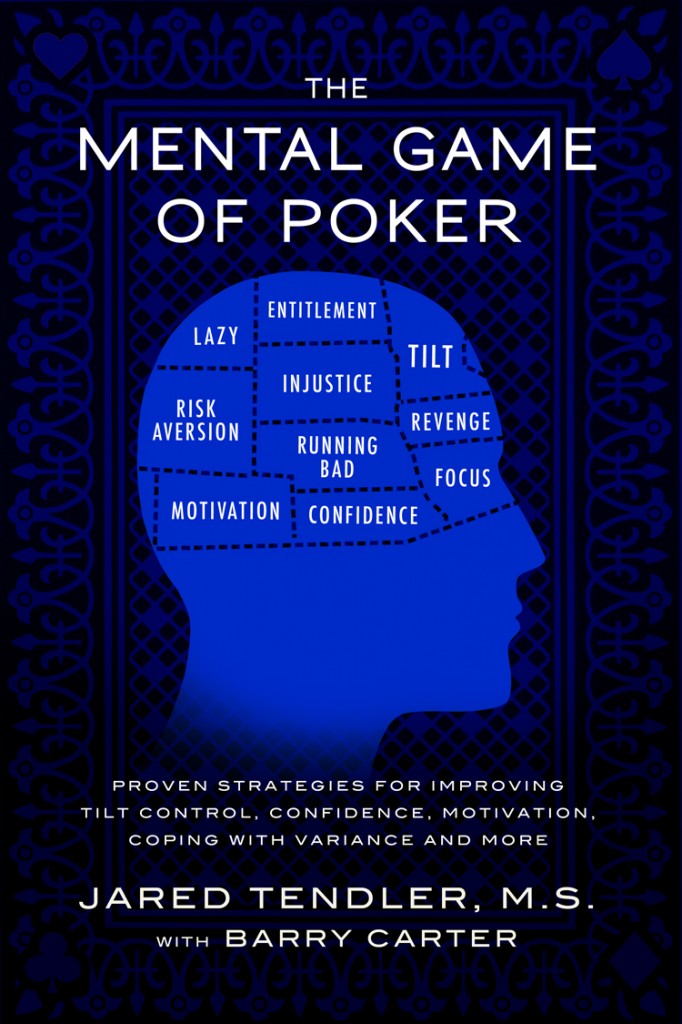Previous part of the book “Mental Game of Poker”: Bad beat stories, envy
5.4 The Bridge of Reluctance to Lose
Losing is a part of every competitive environment. In poker, it is common because variation is part of the game. In no other game does a better, even the best player in the world, lose as often as in poker.
The fact that you lose is much less important than how you lose. You lose one hand and a small irritation flares up. Later, losses pile up, and irritation gradually turns into tilt.
Most of those reading this chapter know that variation is part of the game. You would like to befriend it, but deep down you hate it. Logically, you understand that variation partly makes poker profitable, but that logic is not enough to prevent tilt.
When logic is no longer enough, it is usually a sign that some important information has been overlooked, which requires some deeper processing. The first important question you need to ask is why do you not like to lose?
- Is it because of the feeling? Losing usually feels terrible, that feeling lasts a long time and affects other aspects of life.
- Is it because of the money? Monetary gain is essentially how success in poker is measured, so it's no wonder you do not like to lose.
No one will make you learn to enjoy losing or celebrate being knocked out of a tournament, but the following chapters can help you come to terms with losing and accept it as part of the game.
5.4.1 Competitiveness
No matter what you compete for, being competitive is a good trait. It is a trait that most successful poker players, athletes, and business people have. Competing naturally sparks a strong desire to win, which is good. Being competitive in poker is not inherently a bad thing. Wanting to win money, beat opponents, and make a profit in every session are solid goals. However, in the short term, they are beyond your control.
Everyone will agree that sometimes very profitable situations arise where we lose to bad players. We all understand this logically, but at the moment it happens, it becomes difficult to follow logic.
To understand why losing is such a big problem, let's first figure out what you gain from winning, aside from money. Every time you play poker, you put more than just money on the line, so it's worth taking some time to define those things. Here are some examples:
- Being better than your opponent;
- Ability to pay bills;
- Achieving poker goals;
- Respect from people who think you are making a mistake by playing poker;
- Confidence;
- Ability to move up in limits;
- Others' opinions about your game;
- The time, energy, and work you invest in poker;
- A greater chance of retiring early;
More than just money is always at stake. You compete for the above things and many others. When you lose, you lose not only money but also confidence, respect from others, or other things from the list. You do not like to lose because much more is at stake than you think.
Losing becomes more bitter when you assume that even more losses will come in the future. The feeling worsens when you can't imagine winning at all. Such future predictions further fuel the tilt. When you believe that more losses await in the future, additional reasons arise to worry today.
The solution to this type of tilt begins with a better definition of the real problem. Being competitive is not the problem. Irritation over losing is also not the problem. You have goals, a lot is at stake, and irritation because things are not going according to plan means you care about the things you invest in this game. Moreover, a little irritation can motivate you to work harder on your game. Successful athletes always channel their irritation this way, but this can only happen when additional layers of irritation that can cause anger, hatred, or rage are removed.
Based on the information in this chapter and considering the points below, find the cause of your reluctance to lose tilt and the appropriate solution:
- Define winning. Since winning is more than just money, try to understand what other factors affect you and how to fulfill them. This is especially important for hard-to-measure things like respect, effort, and achievements. For example: How will you know you can move up in limits? Winning means your bankroll consists of 60 buy-ins. When will others start respecting you for your occupation? Winning means you have been able to support yourself for five years from poker income, and if after that time they don't respect you, it's not your problem. When will you understand that you are better than your opponents? Winning means having a better win rate or beating them in many hands played head-to-head.
Write down the answers for all the factors that mean winning to you. Read them every time before you sit down to play. Often, it is automatically assumed that when you lose, you lose all that you wrote down, but that is not necessarily true. You may actually be winning, even if you don't realize it.
- Stop assuming that losses will continue. The assumption of losing is false because it means you believe your future predictions will be 100% accurate. But they won't be. To neutralize this assumption, do the following task (but do it when you are relaxed or at least not irritated):
Look at the highest and lowest points on your poker career graph. This will help you see the bigger picture. In the past, when you were losing, you also assumed that failures would continue, but they didn't. Constantly remind yourself of this fact, and you will eliminate the irritation that would otherwise build up.
INSERT LOGIC: DO NOT LET VARIATION NEGATIVELY AFFECT YOU AND RUIN YOUR GAME.
5.4.2 Lost Money
Another reason why you do not like to lose is the thought that lost money disappears forever (this is especially evident when playing HU, where a player wins and immediately runs away from the table). Instead of thinking about money as something that is won or lost every time you sit down to play, it is better to think of it as an investment in your advantage, which will bring profit over time. This thinking seems logical, but the fact that you tilt when losing money proves that you care about short-term losses, not long-term results.
When thinking about won and lost money, it is advisable to follow the rules common in the business world. In many business areas, there is a big difference between the money you have and the money you count as income. For example, a retail store offering up to 30 days money-back guarantee understands that money is really earned after that period ends. Until then, the money is actually held in the cash register but is not yet counted as income. In poker, if you think that all the money won in the short term (especially when you are lucky) belongs to you, then it is understandable that there is great irritation when you lose what you have not really earned yet. Very often, the seed of reluctance to lose is planted when you assume that everything you win is your income.
Unlike in business, in poker, it is difficult to understand whether the lost money really disappears forever or if it is just an investment in your advantage. Some players only think about their win rate – if they lose one buy-in per hour, they instead think that they earned their average x$ profit per hour. If this thinking helps, then do it. Just be prepared that after a longer period, your actual profit may be less than expected.
Some players believe that using an hourly rate is a way to rationalize losses.
But such a calculation becomes reliable only when the hourly rate is calculated based on large numbers of divisions. Regardless of how you assess losses, never think that the money won in the short term is yours unless you can prove it.
INSERTED LOGIC: MONEY ON THE TABLE IS AN INVESTMENT IN YOUR ADVANTAGE. IF YOU LOSE WHILE PLAYING PROFITABLY, THEN THE LOSS IS TEMPORARY AS LONG AS YOU MAKE +EV DECISIONS AND CONTINUE TO IMPROVE.
CLIENT STORY
Jordan “iMsoLucky0” Morgan
Tournament and mid-stakes cash game NLHE player
Before meeting Jared, I already had Full Tilt sponsorship and had experienced success in many tournaments. I wanted to transition to cash game poker but had problems with tilting. I chased losses, jumped limits, and was essentially a degenerate gambler. After losing, I would always tell myself: “I have to get that money back; I have to recover; I can do this; I am in control.” But I was controlling not the short term, but the long term, and many of my problems were resolved when I understood this.
Improvement came quite quickly. The very understanding of what was happening in my mind solved many problems. Warming up before the game and taking notes after it helped me identify my tilt signs, which helped me address psychological issues more quickly and effectively. Now I am calmer, more realistic, less idealistic, and understand that some things in poker just have to happen.
INSERTED LOGIC: I CAN'T ALWAYS PLAY PERFECTLY, BUT I CAN PLAY THE BEST I CAN AT THAT TIME.
ALTHOUGH IT MAY NOT SEEM LIKE IT NOW, I HAVE AN ADVANTAGE IN THIS GAME, BUT IT DISAPPEARS WHEN I TILT.








